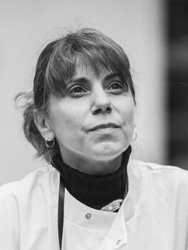Archive | BioInfoMed’2022 ⬛ Scope & Topics | Organizers | Committees | Invited speakers | Important dates & Submission | Programme | Book of Abstracts | Awards & Winners
 |
BioInfoMed’2022 Invited Speakers
Prof. Krasimira Tsaneva-Atanasova (United Kingdom)
|
Abstract
All living organisms exchange molecules with the environment. Organisms strive to take up molecules essential for subsistence such as sugars, amino acids and ions while simultaneously attempting to exclude poisonous molecules such as toxic waste and drugs. To achieve this aim, the cells constituting an organism are surrounded by membranes that act as physical barriers for unwanted molecules allowing for a controlled molecular exchange. These membranes are made up of lipids that are spanned by proteins that form several different physical pathways for molecular transport across the membrane. Understanding how these pathways help some cells to reduce the amount of toxic compounds they take up from the environment is a fundamental question in biology. In fact, there are important differences between cells even with the same genetic make-up. For example, in a population of Escherichia coli, commonly found in our intestine, some bacteria grow much slower than others. Even more surprisingly, some bacteria within the population are able to survive a quantity of antibiotic drugs that kills the rest of the population. In contrast, little is known about cell-to-cell differences in the ability to take up compounds and how the environment affects such capabilities. In this talk I will present our work so far on determining how can two genetically identical cells accumulate substantially different quantities of a given compound. To tackle this question we develop and use a novel combination of cross-disciplinary approaches drawing on complementary expertise in single cell microbiology, mathematics and omics.
Curriculum Vitae
Krasimira earned her undergraduate and MSc degrees in mathematics at the University of Plovdiv, Bulgaria from 1991 until 1996. In September 2001 she started a PhD in applied mathematics at the University of Auckland, New Zealand. After completing her PhD in October 2004 she spent 18 months as a post-doctoral fellow at the Laboratory of Biological Modelling, National Institutes of Health, USA and another 15 months as a post-doctoral fellow at the Department of Mathematics and the Department of Biology at Ecole Normale Superieure in Paris, France. Krasimira joined the Department of Engineering Mathematics at the University of Bristol in October 2007 as a lecturer and was promoted to a Reader in Applied Mathematics in 2012. She moved to the College of Engineering, Mathematics and Physical Sciences, University of Exeter (UoE) in July 2013 where she is a Professor of Mathematics for Healthcare. Currently, Krasimira is the Associate Pro-Vice Chancellor for Research and Impact in the Faculty of Environment, Science and Economy at UoE (2022-2025).
Current Research Roles and Activities
* EPSRC Strategic Advisory Network member (since 1st April 2021).
* Director of the EPSRC Hub for Quantitative Modelling in Healthcare (EP/T017856/1
https://gow.epsrc.ukri.org/NGBOViewGrant.aspx?GrantRef=EP/T017856/1,
2021-2025).
* Living Systems Institute Assistant Director.
* Co-director of the University of Exeter ISSF TREE.
* Alan Turing Institute Fellow since October 2018.
* Hans Fischer Senior Fellow (since April 2019) at the Technical University of Munich (TUM) Institute for Advanced Study (IAS).
* Fellow of the Institute of Mathematics and its Applications (since April 2020).
